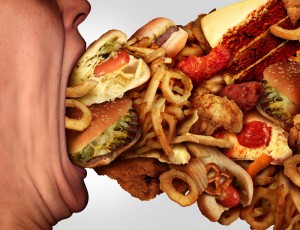Fight Caregiver Stress Eating
Caregivers live with stress on an almost daily basis. The stress comes in many forms – from caring for your family, working and taking care of your aging parents, your career and more. Being a caregiver means you are running almost non-stop from place to place. When you’re hungry the easiest thing to do is grab fast food to gobble down while you’re on the road.

Stress leads to overeating and that means you’re making bad food choices and that leads to weight gain. If you recognize any of the scenarios in which you’re stressed and find yourself seeking solace in a bag of potato chips or a tub of ice cream there are ways to combat that. It starts with being mindful of times when you’re stressed and tempted to reach for the easiest, unhealthiest foods possible.
How can stress cause you to gain weight? Here are a few ways:
- If your brain detects a threat – and it considers stress a thread – it will release certain chemicals that can lead to weight gain. Adrenaline will wear off but its effect, cortisol aka the stress hormone, remains and it will signal your body to replenish your food supplies. If you eat instead of working off the stress, it will lead to weight gain.
- Anxiety also leads to weight gain because of the continual adrenaline surge followed by the cortisol production. Individuals who feel continual stress and anxiety will find it difficult to lose weight because their body is fighting against their efforts. Additionally, many people are “stress eaters” and look for comfort in comfort foods and these foods tend to be high fat, processed choices.
- If you’re dealing with caregiver stress you may also find that you either can’t sleep when you go to bed or you have so much to do that you’re going to bed so late that you’re not getting your full eight hours. If you lie awake worrying about the bills, worrying whether your parents are safe, wondering if you’re missing too much quality time with your children your body won’t have the time it needs to replenish and repair itself.
How can you address stress eating habits when they hit? Here are three ways:
- Learn to eat mindfully. If you’re “grazing” the cupboards, chances are you will eat more than the recommended portions. If potato chips are what you truly need, read the serving size recommendations on the bag, put that serving into a dish and sit down and truly enjoy the treat.
- Get up and move around. If you’re feeling stressed, a simple walk or a few minutes of vigorous house cleaning or even an impromptu dance party with the kids will help you burn off your anxiety while also helping you burn calories.
- Keep a journal for those times when you’re anxious and feel the need for comfort foods. Write down how you’re feeling. Make note of what caused the anxiety. Consider writing down the food you’re reaching for (keeping a food journal may lead you to make more mindful food choices.) Understanding what triggers your anxiety may help you find ways to deal with it other than through food.
Caregivers need to take care of themselves as much as they care for others.
FREE BROCHURE Today!
